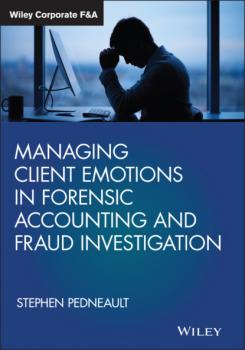Stephen Pedneault
Список книг автора Stephen PedneaultManaging Client Emotions in Forensic Accounting and Fraud Investigation
Manage client emotions in forensic accounting and fraud investigations While many resources exist that outline the primary functional aspects of conducting a forensic accounting or fraud investigation, this book is the first of its kind in addressing the significance of client emotions during investigations and how important the management of those emotions is to the investigation as a whole. Forensic accounting expert Stephen Pedneault has nearly 30 years of experience conducting such fraud investigations, and has become an expert in this form of holistic engagement management. In this comprehensive resource, Pedneault shares his real-world experiences to help the reader understand exactly what role client emotions can play in a fraud investigation, and how to acknowledge and address the emotions of all parties right from the start. Included in the book are pragmatic strategies for managing emotions throughout an engagement, starting with the initial client meeting. Readers will also learn how to develop their own personal approach to managing individuals’ emotions throughout an investigation, which has proven to be much more effective than ignoring or underestimating the role that emotions can play. The book: Is the first resource specifically addressing client emotions in fraud investigations Includes tips for dealing with emotions and managing expectations from the initial meeting Prepares practitioners for future engagements with a new, unique perspective on managing emotions Helps fraud investigators and forensic accountants develop their own personal approaches to dealing with individuals and their emotions For accountants, auditors, fraud investigators, and others in the field, this complete, groundbreaking resource is the quintessential guide to managing client emotions in forensic accounting and fraud investigations.
Preventing and Detecting Employee Theft and Embezzlement. A Practical Guide
If you don't think that some employees have figured out ingenious ways to steal from businesses, read this book. The real-life examples will change your mind. —Joseph T. Wells, CFE, CPA, founder and Chairman, Association of Certified Fraud Examiners "An easy-to-read, but comprehensive step-by-step approach that covers every potential area for employee fraud and embezzlement. Great checklists at the end of each chapter show what steps to put into place for controls and protection. Includes real-life examples that really 'bring the story home.' " —Jean L. Conover, CPA, past CEO/CFO, Jefferson Radiology PC «This book is a must-read for seasoned entrepreneurs as well as those considering entering their own business venture. While developed for small business, the risk detection and prevention methodologies presented by Mr. Pedneault are universal to all businesses. The concise checklists provide ready guidance for establishing a complete system of controls.»—Denise H. Armstrong, CPA, Chief Financial Officer, Sea Research Foundation, Inc. d/b/a Mystic Aquarium and Institute for Exploration «This book is a must for every individual owning their own business. Mr. Pedneault clearly articulates the fraud risks that occur in each business system. In the book, he offers practical advice for internal controls and illustrates the risks with real-life examples.»—Leonard W. Vona, President, Fraud Auditing, Inc.
Fraud 101. Techniques and Strategies for Understanding Fraud
A straightforward guide explaining the nature of financial fraud Fraud continues to be one of the fastest growing and most costly crimes in the United States and around the world. The more an organization can learn about fraud in general and the potential fraud risks that threaten the financial stability of the organization's cash flow, the better that organization will be equipped to design and implement measures to prevent schemes from occurring in the first place. Fraud 101, Third Edition serves as an enlightening tool for you, whether you are a business owner or manager, an accountant, auditor or college student who needs to learn about the nature of fraud. In this invaluable guide, you will discover and better understand the inner workings of numerous financial schemes and internal controls to increase your awareness and possibly prevent fraud from destroying your organization's financial stability. It offers guidance, understanding, and new, real-world case studies on the major types of fraud, including An understanding of why fraud is committed An overview of financial fraud schemes White-collar crime Uncovering employee embezzlements Establishing internal fraud controls The nature of collecting evidence With case studies included throughout the book to gain insight to the real world of fraud, Fraud 101, Third Edition describes the features of fraud and then provides proven methods of prevention, as well as solutions to expose different types of fraud.
Anatomy of a Fraud Investigation. From Detection to Prosecution
A one-of-a-kind resource walking you through one complete fraud investigation, from the original tip to conviction in court Anatomy of a Fraud Investigation is an engrossing read and a valuable resource for fraud investigators, auditors, or anyone who suspects fraud may be occuring in their organizations and is unsure as to how to act. It details all phases of a fraud investigation from the first suspicion of fraud to the final judgment in court, through the eyes of a forensic accountant. In each phase, the author provides insights based on his twenty-two years as a forensic accountant from where to sit at the table when you bring the suspected fraudster in for questioning, to how you protect the key sources of information that the suspect will try to destroy once he or she realizes they are under investigation. In-depth analysis of a fraud investigation Based on an actual investigation conducted by the author Each chapter contains valuable tips and key considerations, providing subtext for why decisions were made and bringing to light potential risks A fascinating, insider look at a fraud investigation, Anatomy of a Fraud Investigation helps you better understand fraud detection, investigation, and prevention-from the inside out.




